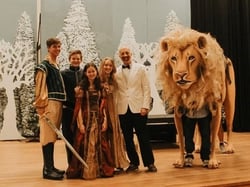 This weekend, Trinitas students continued the long tradition of dramatic stage productions with two performances of C. S. Lewis’s The Lion, the Witch, and the Wardrobe. In the midst of amazing costumes and captivating sets, it is helpful for us to consider why Trinitas invests time and resources into drama.
This weekend, Trinitas students continued the long tradition of dramatic stage productions with two performances of C. S. Lewis’s The Lion, the Witch, and the Wardrobe. In the midst of amazing costumes and captivating sets, it is helpful for us to consider why Trinitas invests time and resources into drama.
By definition, drama is a picture or representation of human life in that succession and change of events that we call story told by means of dialogue and presenting in action the successive emotions involved. As Shakespeare wrote, all the world’s a stage and each of us plays a part. Drama enables students to enter past, present, and future worlds and to explore and discover the lives of others, whether in historical, biblical, or literary settings.
Drama is another tool for educators to use to teach the essentials of the core disciplines of Christian education.
In classroom settings, our students are often called upon to perform orations, poetry recitations, duets and monologue acting, and even plays with quality writing. It is at this point that the teacher is compelled to use his own creative abilities to provide appropriate drama, poetry, historical speeches or original works that fulfill the definition of drama. In doing so each student is offered a significant learning experience that is not based on perceived talent.
Classroom exercises are used on a regular basis to develop voice, diction, movement, rhythm, memory, and group action. The grammar stage begins with exercises in voice, diction, and recitation, moving by the 4th grade to duet acting and one-act plays. The logic stage continues to develop the previous areas and moves to basic “persona” development. The rhetoric stage for the performer will consist of all the former areas and include “persona” analysis and personal speech writing. As you can see the full scope of a classical education cannot detach drama from the disciplines of English, Literature, or History.
In conclusion, drama taught in the setting of classical education from a Christian worldview and with a view to restoration gives a student the opportunity to test his virtues, grow his conscience and overcome obstacles while developing the ability to judge the internal and external influences in the performing arts.



